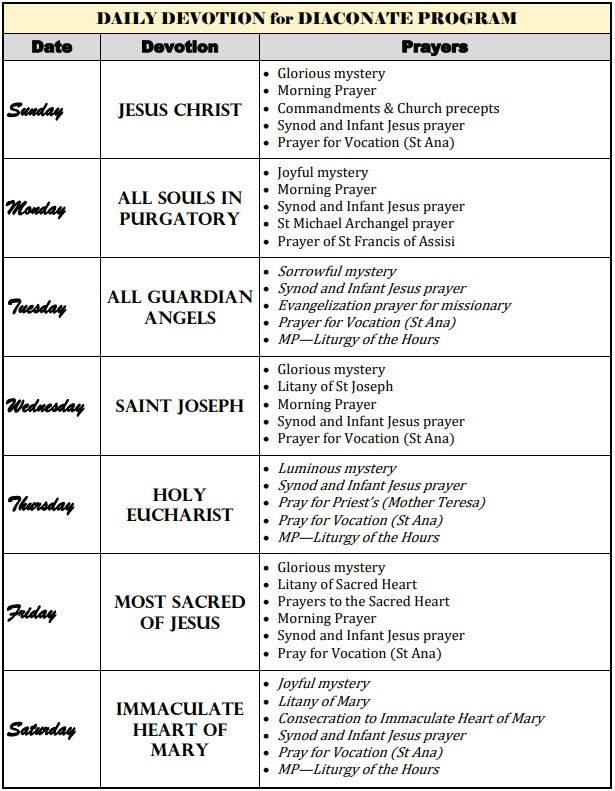SPIRITUAL FORMATION PROGRAM
The context of this experience for the first year seminarian and diaconate candidates includes five elements that influence his growth and formation:
- Cultural environment,
- Experience of ministry,
- Academic progress,
- Personal relationships, and
- Stages of discipleship.
The cultural background plays its part in conditioning the spiritual life. In the orientation into the College and Seminary and then in different courses in the academic program we seek to help our students reflect on their life experience. They gain some ability to recognize the values inherent in their culture, to find how they received faith through family and community.
When they detect something of the presence of Christ in their own history, they will be better able to see how the Gospel also challenges their culture. Our spiritual formation program aims at facilitating that journey of conversion that leads to deeper discipleship. The experience of some involvement in parish life and different forms of ministry is often prominent in the vocational awareness of students entering the College and Seminary. It is increased during the College and Seminary course, both during the terms, and in the vacation periods. It is a focus of our spiritual formation program that the students are helped to recognize the “ingredients” of College and Seminary life. These include a variety of activities such as services within the community, accepting responsibilities, working with a team, attending lectures, preparing assignments, pondering and living the Word of God, celebrating the Sacrament of Reconciliation
(individually or in communally), participating in the daily Eucharist, and developing a steady prayer life – are all ways of building community and practicing ‘diakonia’ now, as well as preparation for future ministry.
We stress the importance of prayerful reflection on pastoral experience and academic learning. In forming permanent deacons and diocesan priests of the future we recognize the responsibility of assisting students to develop a capacity to integrate their spirituality and ministry.

Through the program of the college/seminary and class recollection week ends and also the annual retreats, and especially through the forums of individual accompaniment and regular spiritual direction, the diaconate candidates and seminarians are opened to grow in relationship with God and
with others. It is precisely in the area of spiritual direction that many aspects of vocational suitability arise and the need for discernment become apparent. The delicacy and responsibility of discernment is no easy task and it is impossible without the guiding Spirit.
The centre around which the diaconate candidates and seminarian gathers and integrates the varied experiences of his life and hears the call to “radical discipleship and commitment” is in his experience of Christ. The shaping of the topics for recollection weekends and the types of retreats are tailored to
the different phases of formation. As a student progresses through the program in College and Seminary, he will come to know with greater clarity:
- where he can experience Christ’s presence (Decree on Priestly Formation Optatum Totius, 4, and Dogmatic Constitution on the Sacred Liturgy Sacrosanctum Concilium, 7),
- and how he may be more deeply drawn into the Paschal Mystery and herald the Kingdom.
This involves an interaction of liturgy and life, of contemplation and action in which loving faith directs and enlivens action, and action reinforces faith. We look to see signs of eagerness for ministry and at the same time a realistic appreciation of the need for deeper penetration into the Gospel and Church’s teaching in the students returning from their pastoral year. This ‘outward look’ development is a healthy sign in a senior student preparing for public, spiritual leadership in the Presbyterium.
When the formation process is working well, students become alert to the leaven of the Kingdom transforming their awareness. They will also be discovering the resistances that hinder their deeper conversion. It will always be both a `going-to’ and a `being-sent’ by Christ…”Make your own the mind of Christ Jesus” [Phil. 2:5]. The overall spiritual formation program seeks to assist the students to grow in the freedom required for responsible vocational choice and commitment.
The college and seminary formation program aims to prepare candidates for the permanent deacon and diocesan priesthood and to make them effective ministers in the diocesan community as collaborators with the Bishop and his Presbyterium.
The task of the spiritual formators is to help the future ministers become:
- eager to take up the challenges facing the Church and the clergy,
- equipped to be sent on a mission alive with possibilities, both dangerous and adventurous.
In this formation process, freedom and self-determination need to be accompanied by prudent accountability. The Spiritual Directors and the Diocesan Formators are vital agents in this process.

Note:
- All Prayers are found in “TUSI TATALO mo AIGA KATOLIKO”.
- Daily devotions starts an hour before the Holy Sacrifice of the Mass.
- Sunday afternoon starts with Holy Hour at 3pm. Follow by Chaplet and other program as set out by Dcn Fa’afetai.
- Tuesday, Thursday and Saturday rosary will pray in English. Other devotional prayers can be in Samoa.
- Monday is a Silent Mass, meaning NO HYMN at all, except for Feast day or Solemnity.
- Wednesday Novena at 6pm within an Holy Hour, then Benediction at 7pm.
- First Friday Holy Hour after Mass.
- The RITE of RECONCILIATION, meaning CONFESSION day are on Day of Recollection as outlined in the Calendar.
- Friday Fast starts at 6am until 3pm after Divine Mercy chaplet.
- Daily communal Divine Mercy chaplet.
- Every Family will pray the ROSARY at the Blessed Mother’s grotto. The SACRED HEART image will be process through each family per week.
QUESTIONS?
Whether you are interested in learning more about your faith or wish to pursue a career in ministry or pastoral areas you will find something at Moamoa Theological College and Seminary to meet your needs. We’re here to answer any questions.
